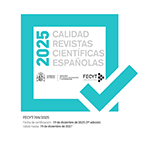Work and wages of artisans in Madrid, 1690-1836 A qualitative approach
Abstract
This article proposes an analysis of artisans’ wages in early-modern Madrid from a perspective which, rather than the adult male’s, takes apprentices’ wages as the main reference, in both the private (artisan workshops) and the public sectors (mills in hospices and orphanages). It focuses on the monetary and non monetary compo-nents of artisans’ incomes, in order to uncover the mechanisms that regulated them, taking as explanatory elements the context of the workshop, the family cycle, and the leverage of journeymen’s associations. The empirical base comprises 1,953 in-denture contracts for 25 crafts, the accounting books of the Hospice of the Ave María and the foundling school of Niñas de la Paz, and the documentation related to con-flicts held between masters and journeymen over wages.Downloads
Article download
License
In order to support the global exchange of knowledge, the journal Sociología del Trabajo is allowing unrestricted access to its content as from its publication in this electronic edition, and as such it is an open-access journal. The originals published in this journal are the property of the Complutense University of Madrid and any reproduction thereof in full or in part must cite the source. All content is distributed under a Creative Commons Attribution 4.0 use and distribution licence (CC BY 4.0). This circumstance must be expressly stated in these terms where necessary. You can view the summary and the complete legal text of the licence.









